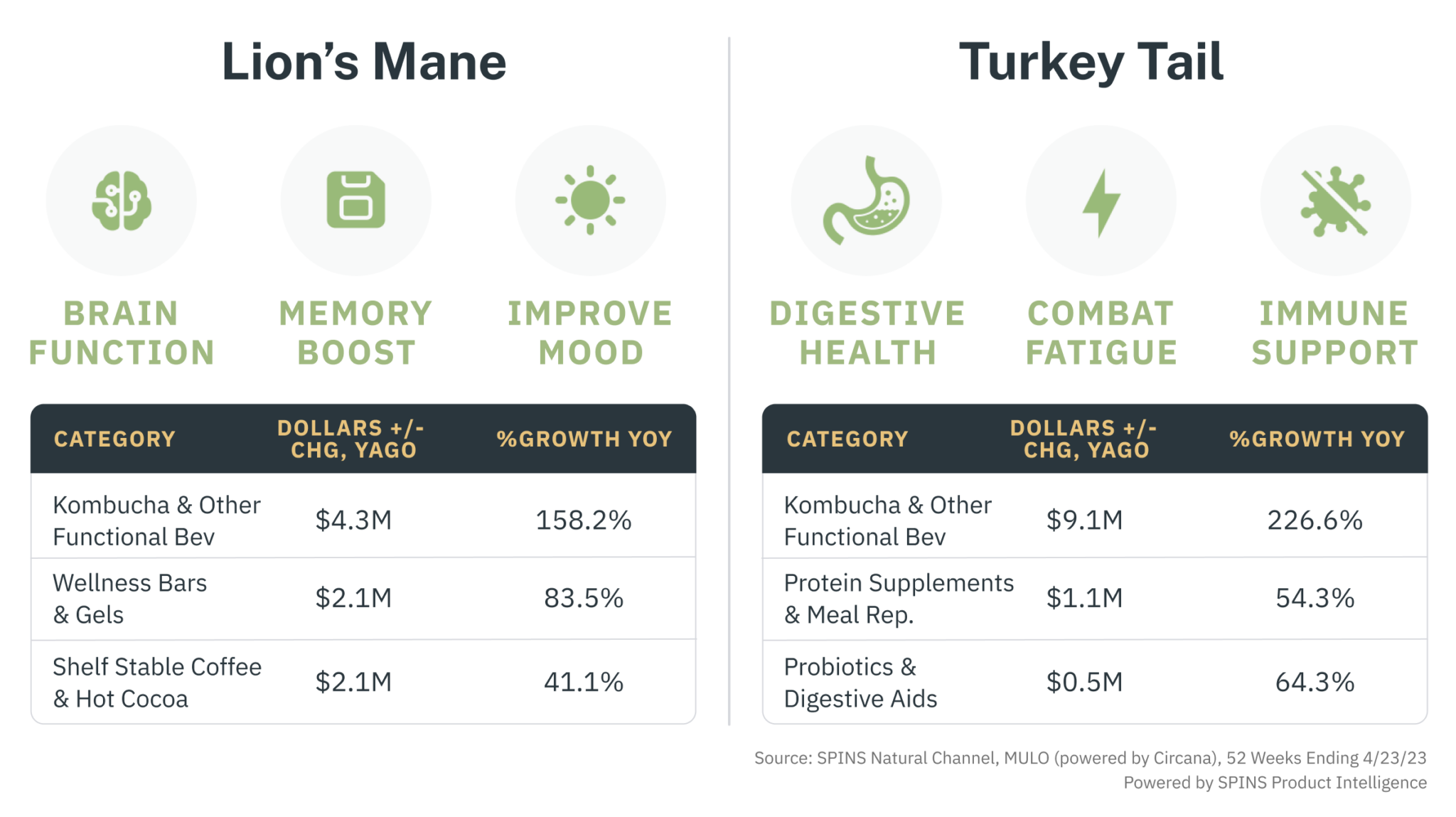Key Takeaways
- Super mushrooms are moving into the mainstream, jumping from the supplements to food & beverage aisles
- They have many different benefits depending on the mushroom and are part of a larger trend of growing interest in functional ingredients
- Top growth categories include:
- Shelf Stable Soup
- Shelf Stable Cookies & Snack Bars
- Kombucha & Other Functional Beverages
Introduction
In recent years, super mushrooms have been one of the many foods that are making the jump from supplements to food and beverage aisles. There are several different mushrooms in the super mushroom umbrella, each with its own set of wellness benefits. In this post, we’ll cover some of the most common ones and the impact they’ve been making on the industry.
What are Super Mushrooms?
Super mushroom is a term used to refer to mushrooms prized for their perceived wellness benefits. While traditionally they found their home in supplements, they’ve spread to food & beverage and even body care.
Some of the most well-known mushrooms and their benefits include:
- Lion’s Mane: Most recognized for its important work in supporting brain function, memory, and mood.
- Turkey Tail: Has been used for thousands of years to stimulate the immune system, combat fatigue, ease digestive trouble, and even treat upper respiratory infections.
- Maitake: Known for having high levels of polysaccharides, beta glucans, and MD-fractions. It has been used to improve immunity and general wellness.
- Shiitake: Found to improve immunity, enhance heart health, supply antimicrobial benefits, increase energy, and support skin health.
- Cordyceps: Contain bioactive compounds that are known to activate the immune system or increase energy levels.
- Reishi: Known for their immune system strengthening qualities; also contain dietary fiber and various minerals, vitamins, and amino acids.
- Chaga: Possess high antioxidant activity due to polysaccharide (beta-glucan) content and are known to help the body maintain cell integrity.
Though the benefits of super mushrooms are diverse—it gets better. Super mushrooms are thought to be “synergistic superfoods” when taken with other adaptogenic ingredients (functional ingredients focused on boosting mental health), like ashwagandha or cocoa. These foods are said to multiply the benefits, providing greater effects together than any of them individually.
Why Super Mushrooms Matter
Mushrooms are already a popular food, so it makes sense that mushrooms that not only taste great but also make you feel great would gain traction among shoppers. And it’s not just in the food category—these mushrooms are even making their way into body care in the forms of soaps, lotions, deodorants, and more.
Due to the diverse number of benefits and mushrooms supporting them, super mushrooms can be positioned to shoppers in many ways. Whether as a healthy alternative to caffeine, something to help you relax and destress, or as a natural immune booster, there are plenty of reasons why consumers look to these mushrooms as a means to improve their daily lives.
The rise of super mushrooms should come as no surprise—food as medicine and functional ingredients have been a trending topic for years. As a result, super mushrooms are now joining other high-profile adaptogens like ginseng, ashwagandha, holy basil, and more in the mainstream eye.
Where Super Mushrooms are Growing
As far as the data goes, we’re seeing the growth of super mushrooms begin to stabilize and level off in vitamins and supplements, but a steep upward trajectory of growth continues in the food and beverage space.

YOY Growth of Super Mushrooms
Two rising stars of the super mushroom world include lion’s mane and turkey tail. As previously mentioned, different mushrooms support different health applications, and this can be seen when examining the data.

Different benefits of mushrooms are reflected in their growth categories
While both have proved to be major growth drivers in the functional beverage space (e.g., Kombucha), Lion’s Mane has proven to be increasingly successful in other sectors of food and beverage while turkey tail continues to be a mainstay for shoppers looking to maintain or improve their digestive health.
Conclusion
Broadly speaking, mushrooms have been popular for a long time, so the rise of super mushrooms is to be expected. These super mushrooms have been around for a long time in the vitamins and supplements aisle, and, before that, were prized in herbal medicine.
As research continues into the numerous benefits of these fungi, they continue to see broad adoption as shoppers look to integrate healthier foods into their everyday lives.






